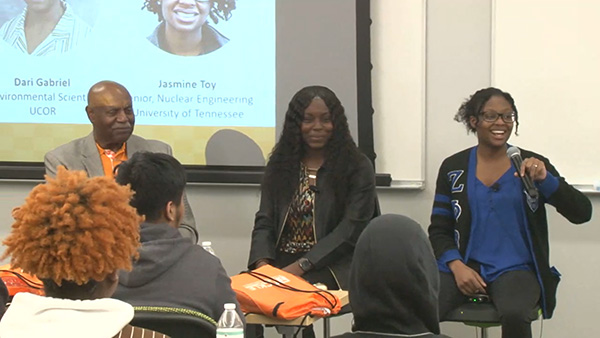
Last October, the University of Tennessee’s Department of Nuclear Engineering (NE) hosted the inaugural Nuclear Engineering Department Heads Organization (NEDHO) Diversity Panel.
The NEDHO convenes multiple times each year to assess the state of NE higher education in the United States. In late 2021, the group reviewed the proportion of graduating NE students who come from historically underrepresented minorities.
The results were far below NEDHO diversity goals—for example, African American students earned fewer than 2 percent of the NE degrees conferred in 2019 nationwide.
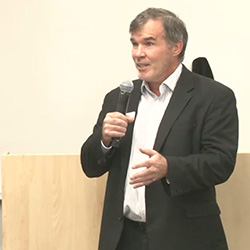
Wes Hines
Wes Hines, a Postelle Professor and Chancellor’s Professor and the head of UT’s NE department, was spurred to action.
“Our department is already a national leader in diversity initiatives for NE enrollment,” said Hines. “I wanted us to continue leading the way.”
Hines helped the NEDHO establish a distinguished speaker series focused on diversity, volunteering to host the pilot event at UT.
Related: A full recording of the 2022 panel, including a transcript, is available by clicking here.
To plan the panel, Hines teamed up with Harold Conner, who holds two degrees from UT and a doctorate from the University of Alabama, sits on the Tickle College of Engineering Board of Advisors, and has more than 55 years’ experience working on nuclear facilities for the US Department of Energy.
Conner was also the first African American engineering student to enroll at UT Martin.
“Dr. Hines and have known each other for some years now,” Conner said. “He and I are not used to saying no to each other.”
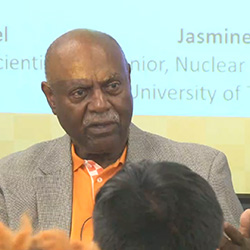
Harold Conner
Hines and Conner envisioned a panel of African American engineers at different points in their careers who could present their stories to African American high school students, encouraging them to follow their passions in engineering and related fields.
“We wanted to talk generally about what you can expect, and how life will be, if you choose an engineering profession,” said Conner.
The NEDHO Diversity Panel series debuted on October 27, 2022, as part of the Tickle College of Engineering’s Engineers Day, an annual event inviting high school students from across Tennessee to visit UT’s flagship engineering college. About fifty high school students attended the panel, many from inner city Memphis schools.
Conner sat on the panel along with environmental engineer Dari Gabriel, who works at United Cleanup Oak Ridge LLC (UCOR), and current UT NE senior Jasmine Toy.
“Visualize yourself as being one of these successful panelists in the future,” Hines encouraged the high schoolers as the panel began.
Over the next half hour, the panelists highlighted the difficulties they faced as well as the passion and support that helped them succeed.
Conner discovered his excitement for engineering during childhood but faced a tremendous obstacle upon graduating high school in 1963.
“There were no black engineering students at UT Martin,” he recalled.
Conner described both the prejudice he experienced from some students and the support from other students, teachers, and administrators at UT Martin that kept him on track.
“My thrust and my passion was becoming an engineer, and I wasn’t going to let anything stop me,” he said. “Over five and a half decades, engineering has been a ticket for me to advance my career and do things that are meaningful to society.”
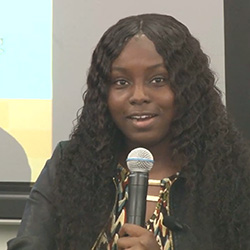
Dari Gabriel
Gabriel received a full basketball scholarship at Benedict College, but the athletic training disrupted her engineering coursework.
“We had practice like two, three times a day, and then still had class throughout the day,” Gabriel said. “I just came to a point where I had to choose which one was going to help me be more successful.”
The choice became clear when Gabriel took her first course in environmental engineering.
“My first day of class, I fell in love with it,” Gabriel said. “I’ve always (wanted) to help the earth and help people out… And so, I felt like, with that major, I can be like a superhero.”
Toy was very surprised to end up an engineer.
“I hated math my entire school career,” Toy said, describing herself as a class clown.
However, late in high school, science concepts started to click—especially nuclear physics. Toy’s path seemed clear when she enrolled at UT, but two years later, a new challenge emerged.
“Sophomore year, I started to realize that when I was in class, I was not able to pay attention,” Toy recalled. “My grades got significantly worse… I legitimately thought about dropping out.”
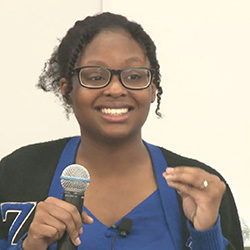
Jasmine Toy
Instead, with encouragement from her classmates, family, and sorority sisters, Toy sought help. She was diagnosed with Attention-Deficit/Hyperactivity Disorder, or ADHD.
“Being diagnosed with a learning disability when you’re 20 is not for the weak,” Toy told the high schoolers. “But there is nothing like adversity to show you who you really are.”
In the last half of the panel, the panelists fielded questions from the high schoolers.
“It was better than expected,” Hines said afterward. “The room was full of enthusiastic students, and they were fully engaged, asking questions until time ran out.”
The panelists left the experience feeling fulfilled and energized.
“When students see someone who looks like them in an influential position, I think it allays their fears,” said Conner. “It gives them the mentality of ‘I can do this; I’m equipped to do the same thing (they did) and enjoy the same benefits.’”
“I believe that seeing someone (who) looks just like you in a position that you hope to be in is the greatest encouragement,” Gabriel agreed. “Talking to people that you can relate to can give you more knowledge and wisdom throughout the journey.”
“Events like this one are vital,” Toy said. “When African American students come on tours, they want to see people who look like them being successful in their intended program of study.”
Following the success of UT’s event, Georgia Tech and the University of Michigan have committed to hosting the next two NEDHO Diversity Panels in spring and fall 2023, respectively.